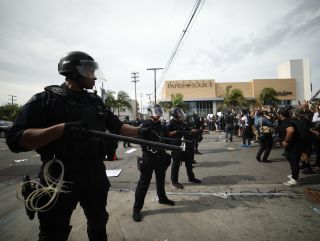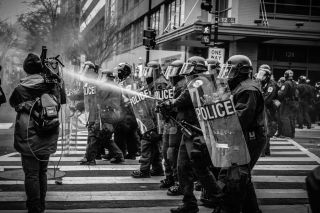Bias
Are Black Cops Always Better for Black Communities?
When "blueness" overrides blackness in policing.
Posted February 14, 2023 Reviewed by Lybi Ma
Key points
- Racism is deeply embedded in our nation's culture and policing is no exception.
- Hiring Black officers to reflect the racial composition of Black communities doesn't always lead to less violent police-citizen encounters.
- Racial bias in policing puts Black people at risk regardless of an officer's race.
- Some studies have shown that Black officers tend to be tougher on Black citizens.
On January 7, 2023, Tyre Nichols, a 29-year-old Black man, was pulled over by Memphis police officers for an alleged motor vehicle violation. What initially started as a routine traffic stop quickly escalated into the violent beating of Nichols by Memphis police officers. After being hospitalized in critical condition, Nichols succumbed to his injuries three days later.
The accused officers were part of the elite Scorpion unit, a specialized police unit created to tackle violent crimes. Scorpion, an acronym for “Street Crimes Operation to Restore Peace in Our Neighborhoods,” has since been disbanded.

The attacks on Nichols were recorded with the officers’ body cams. Still, the most compelling recording came from a street camera in which officers can be seen using a Taser and pepper spray and striking Nichols with their fists, feet, and department-issued batons. Perhaps even more disturbing is that Nichols was left slumped over next to a vehicle for approximately 20 minutes before officers and EMTs rendered aid. The incident is in some ways reminiscent of the Rodney King beating at the hands of Los Angeles police officers in 1991.
The initial findings of an independent autopsy indicated that Nichols died as a result of extensive bleeding caused by the beating. The officers involved in Nichols’ death were quickly terminated and charged with second-degree murder. Several other officers, along with fire and EMS personnel, are also under investigation.
Black people are at disproportionate risk of being victims of police brutality, which has been widely discussed in recent years. In the Nichols' case, some observers were shocked when they learned that the five officers who stand accused of murdering Nichols were also Black.
One of the basic premises of police reform, at least when it comes to addressing police-community relations, is to develop a racially balanced police force by recruiting officers that racially represent the communities they are tasked with serving and protecting. However, Black police officers have been disproportionately assigned to patrol low-income, high-crime, majority-Black neighborhoods. Their daily interaction with Black citizens puts them at risk for becoming resentful or even hostile toward the residents of these troubled areas according to Brunson and Gau (2015). Simply replacing White officers with Black officers may reduce Black citizens’ perceptions of race-based discrimination but has largely failed to change the black community’s opinions that they are the recipients of second-rate policing practices.

The prevailing position within policing claims that if police departments better reflected the racial composition of the communities they serve, incidents of police violence would decrease, which many studies support, but this is not entirely true. In the years following Michael Brown’s death in Ferguson, Missouri, new data has emerged thanks to investigative reporting by the Washington Post, The Guardian, and Mapping Police Violence project. All three reports overwhelmingly corroborate that Black citizens are involved in, and are victims of police-involved killings, at greater percentages than any other racial group in the nation according to Crotty, Crotty, and Fernandez (2017). However, many other studies have either been inconclusive or contradict the findings of the aforementioned reports.
Some studies have shown that Black officers tend to be tougher on Black citizens. For example, A 2007 investigative study by Weitzer et al (2008) found that many of Washington, D.C.’s Black citizens felt that Black officers were tougher on them when compared to White officers, while a 2006 Cincinnati study concluded that Black officers were more likely to arrest the suspect if he or she were Black (Brown & Frank, 2008).
Santos-Carvalho, Midrad-Mizail, & Sampaio (2021) concluded that institutional racism in policing proves to be a problem shared by several countries, not just the United States; thereby suggesting that institutional racism is deeply rooted within the policing profession regardless of the country. In addition to institutional racism in policing, there's also internalized racism, a complex psychosocial phenomenon, which is defined by Ni (2021) as, “the tendency of some individuals belonging to historically oppressed ethnic groups to regularly invalidate, demean, and or suppress their own and other marginalized groups’ heritage, identity, self-worth, and human rights.” To truly address racial disparities in law enforcement, the culture of policing must be changed.

This is not meant to suggest that a more racially diverse police department isn’t a step in the right direction, because it is, but the true goal of community policing is to create and sustain a better relationship between the police and the communities that they serve in lowering crime rates and increasing public safety.
In a 2019 TED Talk, Phillip Atiba Goff, co-founder and CEO of the Center for Policing Equity, said, "The assumption is that racism can't exist in Black people, and so if we have more Black police, we're just going to have different results." It’s quite clear that further research on this topic is warranted to determine the best course of action as we move forward with police reform in 2023.


